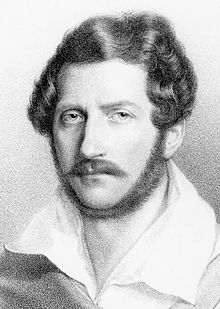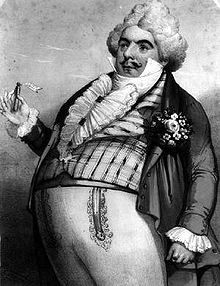- Don Pasquale
-
Don Pasquale is an opera buffa, or comic opera, in three acts by Gaetano Donizetti. The librettist Giovanni Ruffini wrote the Italian language libretto after Angelo Anelli's libretto for Stefano Pavesi's Ser Marcantonio (1810).
At the time of its composition, Donizetti had just been appointed music director and composer for the imperial court of Emperor Ferdinand I of Austria, and Don Pasquale was the 64th of an eventual 66 operas he composed.
The opera, in the tradition of opera buffa, harks back to the stock characters of the commedia dell'arte. Pasquale is recognizable as the blustery Pantalone, Ernesto as the lovesick Pierrot, Malatesta as the scheming Scapino, and Norina as a wily Columbina. The false Notary echos a long line of false officials as operatic devices.
Contents
Performance history
Don Pasquale was first produced on 3 January 1843 at the Comédie-Italienne in Paris.
Other performances during the 19th century include those at La Scala, Milan on 17 April 1843, the first performance in Italy. In London it was presented for the first time in England on 29 June 1843 at Her Majesty's Theatre, and the United States premiere took place in New York on 9 March 1846. The first Australian performance was presented in Sydney on 12 October 1854 at the Royal Victoria Theatre.
While not a part of the "standard" repertory, Don Pasquale appears with some regularity on the schedules of world opera houses.
Roles
Role Voice type Premiere cast, 3 January 1843
(Conductor: – )Don Pasquale, an elderly bachelor bass Luigi Lablache Dr Malatesta, his physician baritone Antonio Tamburini Ernesto, Pasquale's nephew tenor Giovanni Mario Norina, a youthful widow, Ernesto's beloved soprano Giulia Grisi Carlino, Malatesta's cousin and a notary bass Federico Lablache Servants Synopsis
- Time: Early 19th century
- Place: Rome
Act 1
Scenes 1–3: A room in the home of Don Pasquale, at 9 o'clock
Don Pasquale anxiously awaits the arrival of his physician, Dr Malatesta, to describe the bride he has chosen for his nephew Ernesto. Malatesta, confronted with Pasquale's impatience, mutters that he is a buffoon, but proceeds to describe the attributes of the bride-to-be (Bella siccome un angelo – "Oh, like an angel of beauty'). Honest, modest and sweet – when pressed, Malatesta reveals she is in fact his sister. Overcome with joy, Pasquale demands to meet her at once, and sends Malatesta to fetch her, before singing of the love that has gripped him (Ah, un foco insolito – "A fire unfelt before").
Before he could be summoned, Ernesto enters, and the Don reiterates his terms: that if he marries the lady he has chosen, he will receive a generous allowance; if he refuses, he will be disinherited. Ernesto declares his devotion to Norina and refuses. Don Pasquale decides to marry himself, as he is "old but well preserved". Ernesto pleads with the Don to consult with his friend Malatesta – when he hears that Malatesta supposedly supports Pasquale, he is amazed at this apparent betrayal (Mi fa il destino mendico – "Fate has made a beggar of me").
Scenes 4–5: An apartment in the home of Norina
Norina sits alone, reading a book. She recites a passage, before laughing at the situation described and reflecting on her own temperament (So anch'io la virtù magica – I too know your magical virtues"). She, like Pasquale before her, is impatiently waiting for Dr Malatesta to come and explain his plan at which he had only hinted. A servant delivers a letter from Ernesto, which she quickly reads and is instantly dismayed.
Malatesta arrives to explain the stratagem, but Norina cuts him off and hands him the letter, which he reads aloud: Ernesto has announced his intention to leave Rome, and Europe altogether. Malatesta reassures her, saying that he has adapted his plan. If Don Pasquale intends to marry Malatesta's sister, then he will present Norina in her place. Having arranged for his cousin to act as a notary, they will easily deceive the Don. Norina consents to play her part in the deception, and they discuss her strategies in a lively duet (Pronta son; purch'io non manchi – "I am ready; if I do not miss").
Act 2
A salon in the home of Don Pasquale
Ernesto is alone: lamenting his fate, he considers his decision to leave Rome (Cercherò lontana terra – "I shall seek a distant land") in a hauntingly lyrical aria. He leaves the room just as Pasquale enters, dressed in his finery, along with his servant, to whom he gives instructions to admit Malatesta on his arrival. He parades around in his grand costume, hoping it will conceal his advancing years.
Malatesta arrives with Norina in tow, and introduces her to Pasquale as his sister, Sofronia, newly arrived from a convent. Pasquale is smitten, and Norina plays the part of a dutiful, modest and submissive lady, much to Malatesta's evil delight and Pasquale's evident satisfaction. Norina consents to the proposed marriage, which delights Pasquale. He wants to send for the notary to conduct the ceremony straight away – conveniently, Malatesta says has brought one along (his cousin Carlino, who is masquerading as a notary), who waits in the antechamber.
Malatesta fetches the supposed notary, as servants arrange a table. Taking his seat, Carlino writes out a marriage contract as dictated by Malatesta and Pasquale (Fra da una parta – "Between, on one hand"). The contract is quickly drawn up: Pasquale signs but, before Norina can affix her signature, Ernesto bursts in. Intending to say a final farewell, he is amazed to see Norina about to marry Pasquale. However, Malatesta persuades him not to say anything (Figliol non mi far scene – "Son, don't make a scene"), and he is forced to act as the final witness.
As soon as the contract is signed, Norina abandons her pretence of docility, and refuses Pasquale's embrace. She announces her intention to teach him manners, and to have Ernesto as a gallant to accompany her on evening strolls. Pasquale is horrified at this transformation, while Malatesta and Ernesto can barely conceal their amusement. (È rimasto là impietrato – "He stands there, petrified"). Summoning the household staff, Norina recites a long list of demands – more servants (young and handsome at that), carriages and horses, furniture – and instructs them to spare no expense. Pasquale is stricken at his misfortune, so Malatesta urges him to go to bed, with a warning to Ernesto and Norina to maintain the deception.
Act 3
Scenes 1–5: A room in the home of Don Pasquale
Pasquale sits in a room, surrounded by piles of newly-purchased jewels, dresses and the like, as the servants bustle in and out of Norina's apartment (I diamente presto presto – "The diamonds, quickly, quickly"). Dismayed by the piles of bills and invoices, the Don summons the courage to confront his tyrannical new wife. Norina emerges, dressed to go out. He attempts to reason with her, but she pays little heed (Dove corre in tanta fretta – "Where are you running in such a hurry"). He suggests that if she leaves, he may not allow her to return, an idea that she meets with patronising insincerity (Via, caro sposino – "Dear little husband"). As she exits, she drops a note which Pasquale picks up and reads. The note is addressed to Sofronia, arranging a meeting in the garden with its unnamed, admiring author. Pasquale calls for a servant to summon Malatesta, before leaving the room.
The servants return and, amongst themselves, at once complain at the amount of work they are being made to do, and reveal how much they are enjoying the farcical drama developing between Pasquale and his new wife (Che interminabile andirivieni! – "Such endless coming and going!"). At the approach of Malatesta and Ernesto, however, they exit, assured of more entertainment to come. Malatesta reminds Ernesto of the finer points of their plan, and the latter leaves. The doctor moves forward to greet Don Pasquale, who tells him of Norina's intended assignation, and his own plan to expose her unfaithfulness before a magistrate. Malatesta persuades him to moderate his plan and Pasquale, believing him an ally, consents to his conditions, while contemplating his revenge on Norina (Aspetta, aspetta, cara sposina – "Wait, wait, dear little wife").
Scenes 6–7: The garden, adjoining Pasquale's house
In the garden, as night draws in, Ernesto sings of his love for Norina, as he waits for her arrival (Com'è gentil – "How gentle"). At last, Norina emerges, and they sing of their love for one another (Tornami a dir che m'ami – "Say again that you love me"). Don Pasquale and Malatesta have observed and, as they reveal themselves, Ernesto covers himself with a cloak and runs to the house. Pasquale tries to confront Norina – he has caught her in flagrante – but this only provokes a fight that leaves the Don spluttering. She refuses to leave at his demand, so Malatesta, as per his agreement with Pasquale, takes over. Pretending to negotiate with Norina/Sofronia, he tells Pasquale that the only way to make her leave will be to allow Ernesto to marry his beloved, whom "Sofronia" apparently despises. Pasquale consents, and calls out to the house, from which Ernesto and the servants emerge. He instructs Ernesto to send for his would-be bride, but Malatesta reveals that Norina is in fact the woman Pasquale thinks he married, while the real Sofronia remains in a convent. All are reconciled, and the moral of the story – not to marry in old age – is revealed in a playful quartet (La moral di tutto questo – "The moral of all this").
Recordings
Year Cast
(Don Pasquale, Norina, Malatesta, Ernesto)Conductor,
Opera house and orchestraLabel[1] 1930–31 Attilio Giuliani,
Ines Alfani-Tellini,
Lorenzo Conati,
Cristy SolariLorenzo Molajoli
Teatro alla Scala, Milan Orchestra and Chorus78rpm records: Columbia
Cat: GQX 10100-101051932 Ernesto Badini,
Adelaide Saraceni,
Afro Poli,
Tito SchipaCarlo Sabajno
La Scala Orchestra and ChorusCD: Arkadia
Cat: 2CD 780171964 Fernando Corena,
Graziella Sciutti,
Tom Krause,
Juan OncinaIstván Kertész
Vienna State Opera Orchestra and ChorusCD: Decca "Originals"
Cat: 8974021978 Donald Gramm,
Beverly Sills,
Alan Titus,
Alfredo KrausSarah Caldwell
London Symphony Orchestra and Ambrosian Opera ChorusCD: EMI
Cat: CDMB 5 66030-21993 Renato Bruson,
Eva Mei,
Sir Thomas Allen,
Frank LopardoRoberto Abbado
Munich Radio Orchestra and Bayerischer Rundfunk ChorusCD: RCA
Cat: 09026 61924-21994 Ferruccio Furlanetto,
Nuccia Focile,
Lucio Gallo,
Gregory KundeRiccardo Muti
Orchestra e Coro del Teatro alla Scala
(Stage director: Stefano Vizioli)DVD: TDK 2006 Ruggero Raimondi,
Isabel Rey,
Oliver Widmer,
Juan Diego FlórezNello Santi
Zurich Opera House Orchestra and Chorus
(Video recording of a performance at the Zurich Opera)DVD: Decca
Cat:000944109References
- Notes
- Cited sources
- Melitz, Leo, The Opera Goer's Complete Guide 1921. (Source of the synopsis)
- Other sources
- Ashbrook, William, Donizetti and His Operas, Cambridge University Press, 1982, ISBN 052123526X ISBN 0-521-23526-X
- Holden, Amanda (Ed.), The New Penguin Opera Guide, New York: Penguin Putnam, 2001. ISBN 0-140-29312-4
- Osborne, Charles, The Bel Canto Operas of Rossini, Donizetti, and Bellini, Portland, Oregon: Amadeus Press, 1994 ISBN 0931340713
- Weinstock, Herbert, Donizetti and the World of Opera in Italy, Paris, and Vienna in the First Half of the Nineteenth Century, New York: Pantheon Books, 1963. ISBN 63-13703
External links
- Libretto (Italian) at the Wayback Machine (archived June 10, 2008)
- Longer synopsis of Don Pasquale from English Touring Opera.
- Discography from Stanford website
- Don Pasquale: Free scores at the International Music Score Library Project.
- Don Pasquale (1940) at the Internet Movie Database
- Don Pasquale (TV 1955) at the Internet Movie Database
- Don Pasquale (TV 1985) at the Internet Movie Database
Categories:- Operas by Gaetano Donizetti
- Italian-language operas
- Opera buffa
- 1843 operas
- Operas
Wikimedia Foundation. 2010.


